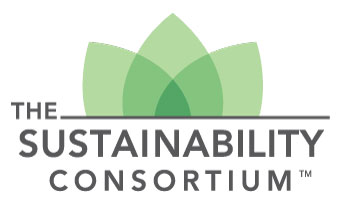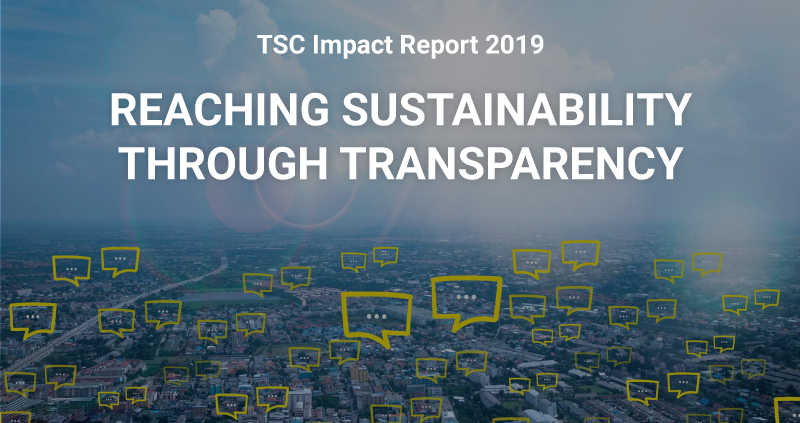TSC Impact Report Shows 30% Improvement in Consumer Goods Supply Chain Transparency Since 2016

“Reaching Sustainability Through Transparency” shows a continued trend towards increased transparency by suppliers answering KPIs as a part of TSC’s THESIS Index
September 4, 2019, Scottsdale, AZ – The Sustainability Consortium (TSC) released its 2019 Impact Report, “Reaching Sustainability Through Transparency”, online today showcasing year-over-year trends in sustainability reporting based on the key performance indicators (KPIs) that drive TSC’s THESIS Index. The data represented includes over $200 billion in annual consumer purchasing from Walmart, Amazon, Kroger, Walgreens, and Sprouts. TSC translates the best sustainability science into business tools that are used all over the world to create more sustainable consumer products. With over 100 members and partners, TSC brings together a wide range of companies, NGOs and sustainability experts to drive environmental and social sustainability impact at scale.
TSC’s latest report shows that product manufacturers have better insights into their own global operations, thereby increasing transparency into sustainability issues throughout their supply chains. Areas of improvement identified include product use, intermediate manufacturing, on-farm activities, and activities in aquaculture.
In 2018, over 1,500 suppliers reported to the Index. On a 100-point scale, the suppliers who participated in the 2018 THESIS Index scored an average of 44.8. This represents a 30.5% improvement from the baseline year of 2016, when the average score was 34.3. In 2017 the average score was 38.6. For a third year in a row, a vast majority of product manufacturers reported that they made changes to products, packaging, and internal or supply chain practices in order to improve their THESIS Index score.
“Over the last decade TSC has made tremendous strides in increasing transparency, which is essential for meeting these goals, and in proving how progress grows rapidly once companies decide to measure the impact of their supply chains. TSC has also emerged as the fundamental tool in driving and unlocking transparency not just for product categories, helping change companies and entire industries,” states Elizabeth Sturcken, Managing Director, EDF+Business at the Environmental Defense Fund (EDF).
This year’s data shows that product manufacturers who have engaged with the Index over a longer period of time have higher scores. Suppliers who commit to reporting to the Index have taken specific actions that are giving them increased transparency over time. TSC reported fewer improvements concerning supplier activities around deforestation and transportation, product packaging, and product end-of-life and disposal.

- TSC’s highest scoring product category was pineapple, which surpassed all others in having the highest THESIS Index score. This is driven my pineapple manufacturers having 100% visibility into key issues in their supply chain like fertilizer and pesticide application, food waste, child labor, labor right, and yield.
- Apparel and home textiles have made significant strides with transparency into water use increasing by 33% and into worker health and safety by 30% since 2016.
- Both chicken and pork have improved scores on measuring environmental and social impacts at the farm level.
- Manufacturers of antifreeze products have made the largest gain of any product category since 2016.
- Manufacturers of specialty produce have widely adopted crop supply mapping techniques in order to understand where their supply comes from and what risks it might face.
TSC Chief Executive Euan Murray states, “We are seeing a remarkable increase in results from companies that have engaged in the Index over multiple years. There are huge rewards for companies willing to be ambitious and to commit for the long haul. As TSC celebrates 10 years this year, I can’t help but be proud of the progress we’ve made and the promise of a more sustainable future.”
Dr. Kevin Dooley, TSC Chief Scientist, says, “We’re seeing that companies take about two years to get new processes in place to have visibility into the sustainability of their operations and supply chains. Once they clearly see what their risks and opportunities are, they are starting to take actions that move the needle.”
This is TSC’s fourth Impact Report. In 2018, TSC published “Transparent Supply Chains for Better Business”. The report provided evidence significant progress has been made in all aspects of increasing transparency. The full 2019 Impact Report can be found here: www.sustainabilityconsortium.org/impact/impact-report/.

In 2019, TSC partnered with SupplyShift on a new reporting platform for THESIS Index, formerly known as The Sustainability Index. TSC has more information about THESIS here. TSC’s retail members include Kroger, Walgreens, Walmart, Amazon, M&S, and Sprouts. TSC does additional work through their beauty and personal care product sustainability rating system with Target, Rite Aid, Sephora and CVS. Founded in 2009, TSC celebrates 10 years of helping companies create more sustainable consumer products. Learn more about TSC’s 10-year anniversary here.
About TSC
The Sustainability Consortium (TSC) is a global organization transforming the consumer goods industry to deliver more sustainable consumer products. We are dedicated to improving the sustainability of consumer products. Our members and partners include manufacturers, retailers, suppliers, service providers, NGOs, civil society organizations, governmental agencies and academics. Each member brings valuable perspectives and expertise. TSC convenes our diverse stakeholders to work collaboratively to build science-based decision tools and solutions that address sustainability issues that are materially important throughout a product’s supply chain and lifecycle. TSC also offers a portfolio of services to help drive effective implementation. The Sustainability Consortium has more than 100 members and there are over 2,000 users of TSC tools worldwide; it convenes more than 200 global organizations annually over an average of 75 networking opportunities. Formed in 2009, TSC is jointly administered by Arizona State University and the University of Arkansas. It also has a European office at Wageningen University and Research. For more information visit www.sustainabilityconsortium.org.
Press Inquiries
Erika Ferrin
Sr. Director of Marketing, Communication and Development
The Sustainability Consortium
(480) 965-7752
erika.ferrin@sustainabilityconsortium.org




